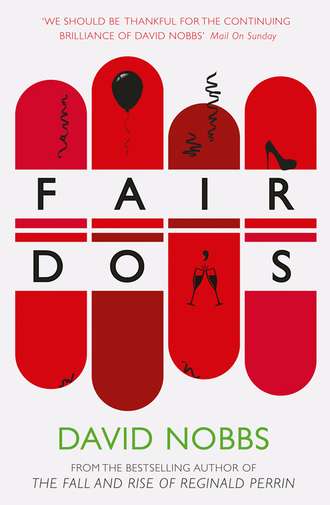
Полная версия
Fair Do’s
Rita gave a tiny, tired grin. ‘I’m all right now,’ she said. ‘Suddenly I’m all right. I feel very small and very cold but very sober.’
‘How lovely she would have looked!’ Betty Sillitoe, over-sentimental as usual, gave a vast sigh. ‘How magnificent her dress would have been.’
‘It still is,’ protested the former big wheel behind Cock-A-Doodle Chickens.
‘You know what I mean.’ Betty sighed again. ‘It was sad to see her drunk, though.’
‘It’s always sad when somebody you like and admire lets themselves down in public. More grape juice?’
‘Please.’
Carol Fordingbridge smiled at Rita, but could think of nothing to say, so, sensibly under the circumstances, she said nothing. She tried to link arms with Elvis, but he shrugged her arm off. Behind them, cold streaks of orange and red were fading slowly to mauves and purples as the short day died.
Sometimes Rita dreaded asking the most simple questions, but this one couldn’t be avoided. ‘Where’s Paul?’
‘He refused to come,’ said Jenny, half embarrassed, half defiant.
‘Good for him,’ said Rita.
‘Oh terrific,’ said Elvis. ‘I face up to the total embarrassment of the occasion, because I love you, and Paul gets praised for copping out.’
‘Elvis! Your mother’s got enough problems without you getting in a temper,’ said Carol.
‘Temper?’ Elvis showed just a touch of temper at the suggestion. ‘I’m not getting in a temper.’
‘No. I know. I’ve seen your tempers,’ said his fiancée. ‘Like when I put tomato purée in the coq au vin.’
‘Carol!’
‘I don’t suppose Jean-Paul Sartre ever lost his temper because Simone De Beauvoir put tomato purée in the coq au vin.’
‘That’s the whole point.’ Elvis sounded wearily long-suffering beyond his years. ‘Simone De Beauvoir would never have put tomato purée in the coq au vin.’
‘Elvis!’ said Jenny. ‘Three quarters of the world are starving.’
‘I know. And I deplore it,’ said Elvis. ‘But I fail to see any logical link between that and putting tomato purée in coq au vin.’
‘This is ridiculous,’ said Jenny. ‘We’ve got more urgent things to think about.’
‘No. Please,’ begged Rita. ‘I can’t take any more talk about the urgent things. Let’s talk about tomato purée.’ Nobody spoke. ‘Nobody has anything to say about tomato purée, it seems.’
‘Hello!’ Simon tossed his absurdly cheery greeting into their resonant silence.
‘Hello, Simon,’ said Rita. He was a man made for morning dress. In sweaters he was a fish out of water, in jeans a laughing stock. He was made for great occasions and Rita had ruined his great occasion, she had ruined everybody’s great occasion. Oh God! ‘Sorry to ruin your day.’
‘Not at all,’ protested Simon, with that bottomless willingness to please that would surely take him far up the ladder with Trellis, Trellis, Openshaw and Finch. ‘Not at all. It’s been a terrific … well, not a terrific … not at all terrific, of course, but … apart from not being terrific, it’s been … well …’
Elvis finished it for him. ‘… terrific.’
‘Well, yes. Well, it has.’
Carol turned the torch of her beauty full onto Elvis’s face. It was a beauty to which only he, it seemed, was blind. And he was her fiancé. Strange are the ways of young love.
‘I’ve spotted a flaw in your logic,’ she said.
‘You what?’ Elvis was incredulous.
‘You said you’d faced up to the total embarrassment of the occasion, but you didn’t know it was going to be embarrassing when you faced it.’
‘I was talking of the embarrassment of Mum marrying Gerry, not the embarrassment of her not marrying him.’
Elvis stomped off. Carol gave a little embarrassed laugh.
‘I can’t seem to do anything right these days,’ she said.
‘Settle for celibacy, Carol,’ said Simon. ‘I have, and it’s terrific. I mean, look at all the chaos the sexual urges get people into.’
‘Yes! Oh yes!’ said Rita.
‘Oh Lord.’ He was appalled. ‘Oh no, Rita. I wasn’t meaning you.’
‘Come on, Simon.’ Jenny led her brother away as one would a small child who has become a nuisance.
Alone with Rita, Carol looked young and vulnerable. ‘Well, I’d …’ she began.
‘No, please, Carol, stay with me,’ begged Rita. ‘I have an awful feeling that the moment I’m on my own Ted will loom up, and I can’t face that yet.’
‘Oh. Right.’ Carol fetched a chair just vacated by Rita’s sneezing uncle, and sat beside Rita. Behind them, a large flock of rooks chattered homewards towards the long narrow wood that screened the hotel grounds from the Tadcaster Road. Their day was ending. Rita felt that hers would stretch ahead of her for ever.
There was an awkward but affectionate silence between the two women as each searched for a topic.
Carol found one first.
‘Is it wrong to put tomato purée in coq au vin?’ she asked.
‘I wouldn’t know,’ said Rita. ‘Ted never let me cook anything foreign.’
Times change. Ted Simcock, ex-foundry owner, ex-husband, ex-refuser of foreign food, handed his ex-lover and her second husband a card and said, unnecessarily, ‘Our card.’ They studied the card’s limited text without interest. He continued unabashed. ‘Our cuisine will be basically a marriage of the bountifulness of Yorkshire hospitality …’ he stretched his arms, to etch in the size of the portions, ‘… with the flair and je ne sais quoi of cuisine nouvelle.’ He garnished the air with his fingers.
‘Who’s your chef.’ It was just a social noise, not inquisitive enough to justify a question mark.
‘Ah! That’s the only slight snag at the moment. Genius doesn’t grow on trees.’ Ted handed his former lover’s husband a bright orange voucher. ‘Present that during our first week, you’ll get a free half-carafe of house wine.’
‘Thank you,’ said Neville politely.
‘Very generous,’ said Liz, her voice drier than Ted’s house wine was likely to be.
Ted moved on, to distribute his vinic largesse more widely.
‘I must go to Rita,’ announced Neville.
‘Neville!’ said Liz sharply.
‘She looks rather trapped with Carol, who has no conversation, poor girl. She’ll be feeling awful.’
‘No. You mean she’s found today an ordeal?’
Liz felt that she had delivered these little shafts of sarcasm rather well, dressing the depth of her feelings in an elegant lightness of tone, rather as a lark might sing if livid. Neville appeared not to notice. Liz raised her eyes larkwards as he ploughed on earnestly.
‘In Rita’s case I feel it’s my particular duty to talk to her. I suspect that she once carried a bit of a torch for me.’
‘Good God, Neville.’ Liz realised that her raised voice was attracting the interest of one of Rita’s aunts. She didn’t care. ‘I’d have thought that was a special reason for not talking to her.’
‘I’m going to talk to her, Liz. By all means come too, if you feel like it.’
‘Righty-ho, sir.’ Liz gave a mock salute and wished she hadn’t. If she kept longing for Neville to be masterful, it wasn’t fair that she should wax sarcastic every time he approached that state.
Carol was giving the lie to Neville’s assertion that she had no conversation, although perhaps laying herself open to the charge that she did not have a wide range of topics.
‘I use tomato purée in lasagne,’ she was saying.
‘I’m sure it’s delicious.’
Behind them a single shaft of crimson defied the onset of night. In front of them, the talk was frenzied. Only Rita and Carol and a couple of footsore aunts were seated in all that throng. Only Carol had the task of keeping a conversation going with the architect of the day’s sensational doings. She searched for something further to say, and, happily, inspiration struck. ‘I use tomato purée in moussaka,’ she said. ‘Probably that’s wrong too. Probably I’m dead ignorant.’
‘I’m sure you’re a very good little cook.’ Rita winced, regretting the ‘little’.
‘No. Elvis says he’ll have to do all the cooking when we give media dinner parties.’
‘“Media dinner parties”! My son, philosopher, rebel and slob, plans “media dinner parties”! Oh, Carol!’ She surprised Carol by leaning over and kissing her warmly.
Neville and Liz arrived, Neville smiling earnestly, Liz faintly.
‘Hello!’ said Neville too brightly. ‘All ship-shape and Bristol fashion?’
‘Absolutely.’ Rita managed a smile. ‘Carol and I have been having a fascinating chat about tomato purée.’
‘Jolly … good.’ Neville frowned as he considered the possibility of fascinating chats about tomato purée. ‘Rita, I wanted to say that, whatever you may think, and whatever you may think anybody else thinks, and I think if you knew what they were thinking you might find that they aren’t thinking what you think they’re thinking, I think, in fact I know, that I have never admired you as much as today.’
Rita burst into tears, threw her posy of freesias at Neville, and rushed from the room.
‘Neville!’ said Liz, before rushing off to comfort her old enemy.
Ted’s ex-wife and the woman who had taken him from her left the room arm-in-arm. Some heads turned to watch, others turned so as not to watch.
‘What did I say?’ said Neville Badger, puzzled doyen of the town’s legal community.
Ted stood beside Sandra, his waitress, his mistress, and watched as his ex-wife and ex-mistress left the room. The dollop of trifle on his plate was forgotten.
‘Well!’ he said. ‘Could this be the start of a beautiful friendship?’
He didn’t want the trifle. He was full to bursting. But he’d felt obliged to take some notice of Sandra, and, since he was determined to keep their relationship secret, he could hardly say, ‘Sandra! I want you. How about a bit tonight?’ He had therefore said, ‘Waitress, I wonder if you could rustle up a last dollop of trifle.’ An excellent ruse, the only drawback being that, the dollop of trifle having been rustled up, he now had to eat it.
‘She can’t keep her eyes off you.’ There was withering scorn in Sandra’s voice, as if anybody who couldn’t keep her eyes off Ted must be mentally deficient.
‘What?’ Ted was puzzled. ‘Who? Liz? Rita?’
‘The tarty piece!’
Ted willed his neck not to swivel. It was no use. He found himself gazing, across Rita’s craggy relatives, past Gerry’s poncy friends, far across the crowded function room towards his vision in yellow. Corinna was waiting for him to look. She smiled. His heart churned. He turned back to Sandra, who was also smiling, grimly.
‘Sandra!’ Ted spoke with a mouth full of trifle. ‘The “tarty piece” only happens to be double-barrelled. Her father’s only a bishop. And a dish.’
‘You what?’
‘A lovely man. And she’s nothing to me, anyroad. So, I’ve nothing to hide. So, I’m going to talk to her. All right? Good.’
He was aware of Sandra’s eyes boring into his back as he negotiated a path between the wedding guests, refusing to meet the eyes of uncles who had drunk all his whisky every Boxing Day and aunts who had given him so much aftershave and deodorant that he had begun to wonder about his personal freshness. What did Rita’s relatives matter now, in this wonderful world in which Corinna Price-Rodgerson had eyes only for him?
‘You’ve been avoiding me.’ She seemed amused.
‘No! Look, Corinna, meeting you today has been very, very exciting for me. I feel …’
‘Aflame with desire?’ She smiled, slightly awkward in her advances, as one might expect from a bishop’s daughter.
‘Lightning does strike twice in the same place twice!’
‘What?’ Corinna was again puzzled.
‘Nothing. I want to be alone with you, Corinna. I can’t wait for Tuesday …’ Sandra arrived with champagne. ‘… s will be stewsdays, stewsdays every Tuesday, Sundays and most days will be roast days … Sandra!’
Sandra continued to pour champagne into Ted’s glass long after it was full. The champagne cascaded onto the floor around his feet. Sandra smiled. Her smiles were formidable.
‘Ladies and gentlemen.’
Ted turned eagerly to listen to Gerry. Anything was better than this confrontation between Sandra and Corinna.
Silence fell rapidly. Rita and Liz entered, having repaired Rita’s shattered face and make-up. Rita looked as if she might faint. Liz clutched her arm and squeezed it encouragingly. Nobody saw them. All eyes were on Gerry. What would he say? What could he say? On this, the worst day of his life, he held an audience spellbound for the only time in his inglorious political career. The irony escaped him.
‘Ladies and gentlemen.’ He stood where Rita had delivered her emotional speech. Gerry’s speech was carefully unemotional. His face was pale and pinched. He looked very young, and so very, very old. ‘Ladies and gentlemen. I’m off now. I’d just like to apologise for the way the day has turned out, and to thank you all for coming, and for all the presents, which were just what we … would have wanted, and will be returned. I’m off to Capri. I had hoped that my bride would be with me, as I understand that this is customary on these occasions. But I’m going anyway; it’s all paid for, and I deplore waste of every kind. It says so in my bloody manifesto, so it must be true.’
Gerry Lansdown looked neither to left nor right as he walked past his wedding guests. He didn’t so much as glance at Rita. He strode out of her life forever, with his head held high.
Rita trembled.
‘Feel up to facing everybody?’ said Liz gently.
‘Oh yes. I don’t think I should run away now. And … thank you, Liz.’
Rita kissed Liz, and Neville, watching, beamed.
‘Our Liz is turning into a real trooper,’ said Rodney Sillitoe, watching from their position beside the apple juice.
‘Well she doesn’t see Rita as a threat, now she’s made such a fool of herself,’ said Betty.
‘That’s a bit ungenerous, isn’t it?’
‘No. It’s realistic. I don’t believe anybody ever does anything except for selfish reasons.’
‘Betty! You do.’ Rodney was astounded. ‘You’re a very sentimental person.’
‘Sentimentality is selfish. When I pat a little boy on the head and go, “There, there! Who’s a clever boy, then?”, who loves it? Me. Who hates it? The little boy. Selfish.’
‘But you’re an incredibly wonderful wife to me.’
‘Because you’re such an incredibly wonderful husband to me that it’s in my interest to be an incredibly wonderful wife to you.’
‘Aaaah! Let’s clink juices and drink to us.’
‘To us.’
They clinked juices.
With Liz at her side, Rita felt able to face her ex-husband at last.
‘Well!’ said Rita.
‘Yes,’ said Ted.
‘What a mess,’ said Rita.
‘Yes,’ said Ted.
‘Oh well,’ said Liz.
There was a brief lull, as if their loquacity had exhausted them.
‘So how did you feel, Ted?’ asked Rita. ‘Sad? Happy? Triumphant?’
‘Rita! As if I … I mean! Really! I felt embarrassed. For you. For Gerry. For me.’
‘For you?’ said Liz.
‘Rita made some rather nasty insinuations about my prowess as a lover.’
‘Ted!’ said Liz. ‘Not now.’
‘No, no. I know. Subject closed. Not the time or place.’ He paused. ‘But. Well, it was, wasn’t it? A bit below the belt. As it were.’
‘No, Ted, it wasn’t below the belt,’ said Rita. ‘I was referring to your emotional commitment, not your physical prowess. You’re all right in that department, and there are people in this room who could second that, I’m sure.’
Liz blushed. She was thoroughly disconcerted. Ted was astounded. He didn’t realise that Rita’s abrupt return to acidity had made her feel angry and confused about her dramatic new role as Rita’s friend and saviour.
‘I really must go and … er …’ Liz couldn’t find any way of ending her sentence.
Ted, not known for his social rescues, leapt to her aid. ‘See if Neville’s all right?’
‘Yes! Exactly! Thank you, Ted!’ Ted wished that Liz didn’t sound so surprised.
Ted and Rita looked into each other’s eyes and saw only the past, their marriage, the painful separation and divorce. The duty manager, Mr O’Mara, trim, precise, prissy and finger-clicking, was fussily organising the drawing of the curtains. It was that moment, on late winter afternoons, that is the most magical of the day for those who are happy at home, as they enfold themselves in a womb chosen and furnished by them; but which, for the lonely, the bored, the inadequate, the defeated, the frightened, is the bleakest moment of all, as they face the long dark evening, and welcome into their homes a group of Australians because, empty-headed and indifferently acted though they may be, they are better than loneliness, or more fun than their nearest and dearest.
Ted, feeling the bleakness, shivered, and reached out to touch Rita.
‘No,’ she said. ‘No. I have to say, Ted … we have to get this straight … my not marrying Gerry has nothing to do with any feelings for you. I’m not coming back to you, ever.’
‘Oh no,’ said Ted. ‘No, no, I know. No. I’ve … er …’ Corinna walked past behind Rita and flashed Ted a quick invitational smile. ‘I’ve … er … I’ve reconciled myself to that.’
‘So I see.’
‘What?’
‘That rather striking woman who just passed.’
It wasn’t the first time that Ted had wondered how Rita could see behind her.
‘Do you notice everything?’ he said.
‘I’m a woman.’
‘Yes.’
‘You’re worried about your sexual prowess, and here you are surrounded by your conquests.’ Rita shook her head at the absurd neuroses of men.
‘Rita! Don’t exaggerate.’ But Ted couldn’t help looking slightly pleased.
‘Me. Liz. The striking woman. The waitress.’
‘Waitress? What waitress?’
‘The one you’re living with. The one you’re so busy trying to keep secret that everybody knows about her.’
Ted was appalled. ‘Rita! You mean …? Oh heck.’
‘I even saw Doreen from the Frimley Building Society going into the other bar. All we need now is the blonde Swedish nymphomaniac and Big Bertha from Nuremberg and we’d have the full set. Ted and his women.’
‘Rita!’ said Ted, desperately trying not to think, ‘Well, yes, I’ve had me moments,’ even more desperately trying not to think, ‘What a pathetic list, compared to Don Juan and President Kennedy and Simenon.’ ‘Why rake over cold ashes, Rita? Why spoon up dead custard? The past is dead. Dead. How is Doreen? How’s she looking?’
Rita gave Ted a long, hard stare, and didn’t tell him how Doreen was looking.
The immaculate Neville Badger of Badger, Badger, Fox and Badger approached. Liz followed, as if on this occasion she were his lapdog.
‘Well, here we are,’ said Neville. ‘Almost like … well, no, not really very like old times.’
‘No,’ said Rita with feeling. ‘Not really.’
It was as if Neville’s approach had been the signal for the full social rescue of Rita Simcock to be put into operation. Elvis and Carol arrived next. Rita’s mind whizzed. Would Carol talk about tomato purée? Did Elvis know that she had never been able to love him quite as much as she loved Paul?
‘Hello,’ said the great philosopher.
‘Hello, Elvis,’ said Liz, and a stranger would have sworn that she was pleased to see him. ‘I heard your sports bulletin yesterday. Very pithy.’
Elvis swelled with pleasure. ‘Thank you, Liz,’ he said. ‘I aimed for … pith.’
‘Then you succeeded.’
Was she mocking him? Could he avoid blushing? Luckily Simon and Jenny scurried up, Simon breezily, Jenny more warily.
‘Hello!’ said Simon. ‘Everybody gathered! Almost like … well, no, not really at all like old times.’
‘No,’ said Ted. With what depths of regret he invested the monosyllable.
‘I’m very grateful to you all for rallying round,’ said Rita, ‘but I think I ought to face the massed ranks of Gerry’s friends and relations now.’
‘I don’t think you should,’ said Ted. ‘They might lynch you.’
‘Thank you, Ted.’
‘No, but is there really any point?’ said Jenny. ‘Will anything you can say to them make anything any better? You’ve explained already. Can you add anything?’
‘Perhaps not,’ admitted Rita. ‘Perhaps we should just go home. “Home”!’
And indeed a few people were beginning to drift off, now that the curtains had been drawn. It was dawning on them that it wasn’t appropriate to linger to the end of such an occasion. Others were staying because they weren’t quite sure how to leave. Should one just drift away? That seemed rude. But was it appropriate to give thanks? And to whom?
‘When I tell Paul!’ said Jenny. ‘He’s going to be so sick he missed it. Oh Lord. I shouldn’t have said that. Not today. Oh Lord. I think I’m going to cry.’
‘Don’t cry! Please!’ implored Rita. ‘Nobody cry. Once I start –’ She changed the subject desperately, the words pouring out. ‘You know, Jenny, what you said about explaining. There’s something I didn’t explain. I couldn’t. Gerry wouldn’t have understood. One of the reasons I couldn’t marry him … it’ll probably sound very silly … he never had any doubts. I doubt whether I could live with somebody who had no doubts.’
‘I don’t understand,’ said Simon.
‘I do,’ said Carol Fordingbridge. Elvis couldn’t prevent his eyebrows from rising caustically. ‘I do, Elvis!’
‘I didn’t say anything,’ said Elvis.
‘I have doubts,’ said Rita. ‘Tremendous doubts. I’m constantly testing my beliefs against my doubts. I don’t intend to hide that even from the selection committee.’
‘Well, no, quite right,’ said Ted. ‘Why should … selection committee? What selection committee, Rita?’
‘I’m trying to enter politics myself,’ said Rita. ‘In a modest way.’ She smiled modestly, shyly. ‘I’m putting myself up to be Labour candidate for the Brackley Ward council by-election.’
Jenny was the first to recover, but even she wasn’t quite quick enough. Later, Rita would wish that her friends hadn’t all been quite so stunned.
‘Great,’ said Jenny, hurrying forward to kiss her mother-in-law. ‘Fantastic. No, that’s really fantastic. Great.’
‘You! In politics!’ Ted didn’t attempt to hide his incredulity.
‘Thank you, Ted.’
‘I’ll have to preserve the full impartiality of my reports, Mum,’ said Elvis grandly.
‘Well of course you will,’ said his mother. ‘I’d have expected nothing less from you.’
Elvis sniffed her remark, suspecting mockery.
‘Labour?’ said Neville, as if the enormity of it had just filtered through.
‘Do you know nothing of my beliefs?’ said Rita.
‘Sorry,’ said Neville.
Liz let her head sink onto Neville’s arm in an affectionate exasperation.
‘If they’ll have me after this,’ said Rita. ‘Oh God.’ She doubled up, as if in physical pain. ‘Oh, I’m sorry. I just … I feel awful.’ Ted and Carol grabbed her. ‘Oh,’ she said. ‘Oh.’ She tried to smile up at their concerned faces. ‘You know,’ she said, ‘when I came in and faced Gerry and everybody, funnily enough I didn’t feel as bad as I expected. I suppose the drama of it keyed me up. But now, when it’s over, and when I wake up in the nights to come, in the months to come, and realise, no, it isn’t a nightmare, I, Rita Simcock, did this dreadful thing … will I ever feel able to smile again? Will I ever feel able to laugh again?’
Betty and Rodney Sillitoe sailed up. They were two galleons, laden to the gunwales with sympathy.
‘Hello!’ said Betty.
‘Hello!’ said Rodney.
‘All gathered together,’ said Betty encouragingly. ‘Almost like … well, no, not really very much like …’
‘No,’ said Ted. ‘Not very. Not really.’
A heavy little silence sat on them, as they reflected upon how unlike old times it was. Rita, whom they had come to support, was the first to make the effort.
‘So, what are you two busy bees up to these days?’ she asked the Sillitoes.
Rodney and Betty exchanged uneasy glances.
‘We’re opening a health food complex,’ said Betty.
‘With wholefood vegetarian restaurant,’ said Rodney.







